Guest Post
-
Hot off the Press: Part 5
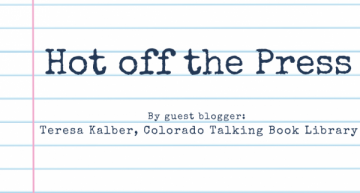
"Hot off the Press" is blog series from guest blogger, Teresa Kalber. Teresa is the Network Systems Administrator at Colorado Talking Book Library. In this series, she shares her library's experience being one of the first two KLAS libraries to implement NLS' Gutenberg equipment.
The first four posts in the series are here:
- Hot off the Press: Part 1
- Hot off the Press: Part 2
- Hot off the Press: Part 3
- Hot off the Press: Part 4
Hot off the Press: Part 5, Problems and ongoing issues
Here is a recap of some of the issues we have/are experiencing with Gutenberg.
Service Queue/Order issues:
- With DoD, patrons now have to the entire collection on BARD. Because of this they are getting books in subjects they may not have been before and also getting a lot of the newer books. We get a lot of RA calls for patrons saying I would never order books like this. The RAs go through their subjects and work with them on getting them the type of books they like. This has brought up the issue that there is no easy way to empty the service queue. Each item must be deleted one at a time. If all the items are deleted out of the queue, KLAS hangs up and usually needs to be restarted.
- Because of the issue above, we are still in flux as to the default number of books we want in the service queue and where the refill point should be. This has also been problematic for us as it results in cartridges going out with less than the 10 we have them set for.
- When RAs are trying to create an order for a patron, it takes our system over 5 minutes to open the “Create Dup Order From Queue” screen. This makes it difficult to create orders for patrons when also taking phone calls because of the time involved. Many times they will have to make a note and go back and create the patron’s order later.
- Cartridges will go out for our on-demand patrons, so we need to have their NS Cutoff set to 0 to prevent that from happening.
- Local Recordings:
- We have been working with both NLS and Keystone to figure out how to get our locally recorded books that are not on BARD to work with Gutenberg. We think we have come up with a solution, but it will take some time to implement.
- Keystone is also working on having functionality for Serials in place for Gutenberg so that we can put our local newsletter on the duplications cartridges.
Cartridge Errors:
- When the service queue is filled, it will select books from our local recordings for patrons. Because we had not solved the problem with our local books, this would cause the cartridge have an “error” status. There is currently not a way to run reports or queries in KLAS to find these errors and make sure those patrons are getting service.
- Also for cartridges that are in error status – the books on the cartridge are not added as a has-had to the patrons record since the cartridge never got checked out. But since the cartridge is on the orders tab, those books are not eligible for selection. There is currently no easy way to get those books back on the service queue.
Gutenberg Hubs:
- Sometimes a cartridge is scanned and the internal and external barcode have not been linked. There is a way to configure a port on the Gutenberg machine to plug in a cartridge and have that connection made. NLS is now sending out the machines with this port already configured. Ours was not sent that way and I had to create the port myself. Once I configured the port, Gutenberg stopped recognizing the first hub in the toaster rack attached to that computer. I don’t know if the two events were related since we have ongoing issues with Gutenberg not recognizing hubs at various times. We are working with NLS on this. It’s a fairly simple fix, but it is an issue.
- Offender (Inmate) Accounts:
- We handle our offender mail separately from our other patrons’ mail. Because of this, we have not converted our offenders to duplication service since we don’t currently have a way to run their cartridge orders separately from the rest of the orders.
- Cartridge issues:
- We ordered a supply of cartridges from Perkins to help with the problem of large orders being created. The Perkins cartridges do not have external barcodes on them. We had to work with NLS to figure out a way to be able to use these cartridges with Gutenberg. Since we placed the order, KLAS put a fix in place to prevent orders larger than 4GB to be sent to Gutenberg for copying.
- We also ran into problems trying to repurpose the green cartridges we purchased to use. NLS had to make a setting change in Gutenberg for us to be able to use these cartridges with the system. However, we have to go into another computer, plug in the cartridges and unlock them with the DTB Protect software before we can use them with Gutenberg.
I hope you enjoyed my posts on our conversion experience. Both Debbi and I have documents we kept during the process that we would be happy to share. I’ve also started a post in the discussion forum if you have questions or would like me to cover something not included in these posts.
-
Issuing MoC: User Insights
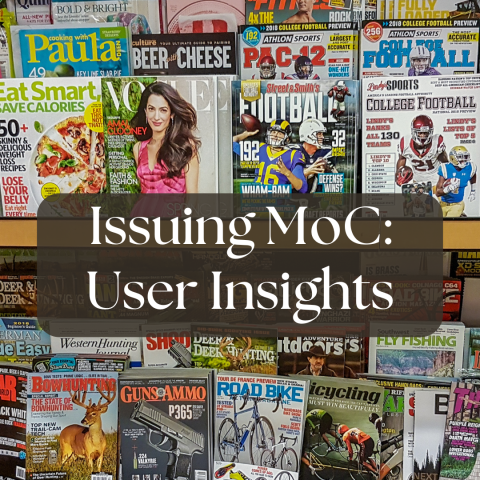
This week we're sharing user perspectives from the two libraries who served as pilot libraries for how libraries for the blind and print disabled will circulate magazines on cartridge (MoC) via KLAS. Michael Lang, Director, State Library of Kansas Talking Books Service, shares the Gutenberg experience and Jesse McGarity, Technical Operations Specialist II, Virginia Beach Public Library, Accessible Resources and Services, provides insights from using Scribe for MoC. A big thanks to Michael and Jesse for testing the waters, helping us improve the process for all of you, and for sharing their experiences!
MoC at Kansas Talking Books Service
Submitted by Michael Lang
Michael Lang, checking in with an update on some of the lessons we learned getting started with local MOC production in Kansas. We ran into a few issues, some were issues of our own making and some were bugs in the system that needed to be worked out. As such, my MOC circulation numbers aren’t going to be very helpful for anyone. Nothing was running as we thought it should have at first. We started, ran for a week, had to pause as the bugs were worked through, and then restarted.
We are running our serials as a separate medium, so that magazines will be loaded separate from books. Our plan is to send them out on a calendar basis, weekly on Wednesdays. We’re still trying to make sure that’s working as intended.
Most of the problems we’ve uncovered are being or have already been patched by Keystone and NLS. Here’s the main problems we ran into.
- Issue 1: Old, some very old, issues of magazines were sent to our patrons. We intend to only send out one back issue to a new subscriber. That’s not how it worked when the switch got flipped. I believe this has been fixed.
- Lesson 1: Pay close attention to which issues are being printed during your mail run at first.
- Lesson 2: Consider cancelling subscriptions for inactive NLS magazines, or patrons might get the last issue of American Heritage magazine from 2019 (fake example) and wonder why.
- Lesson 3: Look at your serials request lists in KLAS and see if anything looks funky prior to flipping the switch. Does someone have reserves for 2009 People magazines? Catch it before it goes out.
- Issue 2: Naming issues with Readers Digest caused multiple duplication errors, an issue that has been fixed by NLS.
- Lesson: Know where your report is for orders in error status and run it throughout the transition. Patron Module – Reports Menu – Statistics – Duplication Order Status.
- Issue 3: Bug in the system has led to 0 new files (books or magazines) being added to our system since 3/15. Almost fixed.
- Lesson: Sometimes being the pilot library breaks stuff, but if you can roll with the punches its worth it.
Overall, we’re excited about where this is going to get us when it’s all smoothed out. It’s given me a chance to email with Nancy and John a bunch which is always a treat 😊
MoC at Virginia Beach Accessible Resources & Services
Submitted by Jesse McGarity
In March, Accessible Resources and Services (ARS) at the Virginia Beach Public Library (VBPL) went live with MoC!
We are sending magazines out on separate cartridges from talking book. This is because we already had cartridges of separate colors (white for talking books, green for braille, and peach for magazines) and because we have a smaller patron size. We set the magazine limit to 15 per cartridge since they are smaller than books, with a max of two cartridges.
Some of the reasons we decided against sending talking books and magazines together is because we had the second color cartridge, but also because we did not want to confuse patrons. Additionally, we did not want to limit the number of talking books a patron would get.
After the first shipment it took us a week or so to figure out our settings were incorrect, but once we did, items started going out. The first two shipments were quite a bit for us (about 90) but as we wait for returns it has been much less. Right now our daily send out very low, about one or two. Hopefully has people realize we are sending them, it will be more.
The next step is to find a good way to add has/hads to each patron account, so they do not missing any issues.
- Issue 1: Old, some very old, issues of magazines were sent to our patrons. We intend to only send out one back issue to a new subscriber. That’s not how it worked when the switch got flipped. I believe this has been fixed.
-
KDAC Update & Thank You
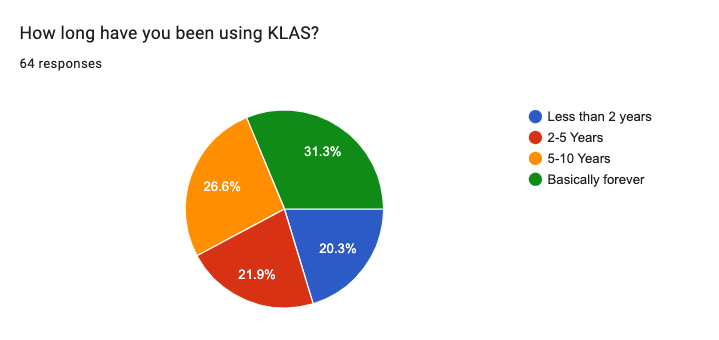
From Sam Lundberg, President, KLAS Development Advisory Committee:
It’s been a few months now since the KLAS User Experience Survey circulated, and the KLAS Development Advisory Committee (KDAC) has spent the time pouring over all the answers we received. Some of you had small, actionable requests that will hopefully be coming down the pipeline soon. Others had big ideas that, rather than being added now, will help inform the next major iteration of KLAS. Finally, are my personal favorite suggestions: small quality-of-life fixes that make each day that 1% easier.
I can’t say exactly what will be coming next or which features will make it to live. We certainly had some common threads around the Service Queue, updating catalog records, the WebOPAC, and tools to handle Has-Had titles. The changes that DoD makes for patron service are starting to become clear and more feedback on how to mechanically address those changes will be vital. I believe there will also be some training coming to discuss requested features that are actually already part of KLAS, if not always obvious.
The survey was anonymous, so I can’t get into the details of the responses. But I can share some interesting demographics data we gathered. Nearly ⅓ of responses came from users with more than 10 years experience with KLAS. Only 14% of responders use hotkeys constantly within KLAS, while 30% use them occasionally and 29% never use them at all.* The klasusers,com discussion forum is still under-appreciated with only 33% of responders saying they use it to interact with the KLAS community, but almost 70% attend the KLAS Conference, webinars, and/or the listserv. Reviewing anonymous survey responses proved tricky because we found many suggestions we wish had more detail or clarification, but that’s the tradeoff for honest feedback on what’s wrong now as well as what we want in the future.
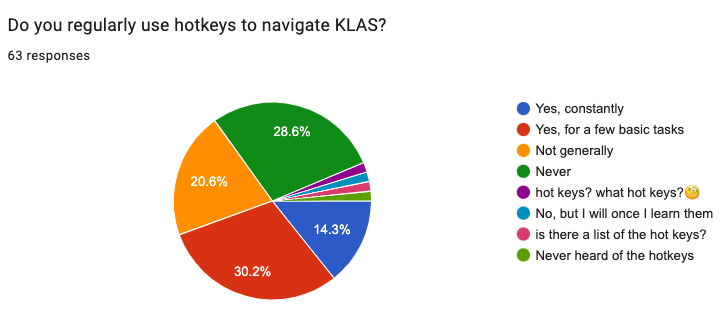
Of course, the conversation doesn’t end with the survey. Keystone and KDAC are always looking at the forum, the listserv, the various live training sessions and presentations (organized or organic), and all other ways users talk to one another. Also, we invite you to speak with any KDAC officer directly about anything you’d like us to put forward. Development is an ongoing conversation about what would be good to add, but also about priorities and allocation of resources. Even if you know something you want is in the works or on the table, be sure to also let us know the importance of that change or feature to you or your library so it can get that extra oomph behind it.
Finally, because I haven’t said it yet in this letter, thank you all for your participation in the survey specifically and the broad mission of KLAS Development generally!
*Note from Katy: If you are among those who don't know what they Keyboard commands are or who need a list to help you become more familiar with them, check out the KLAS Keyboard Shortcut page for a reference.
-
KLAS Conference: A Perfect Tenn!

A guest blog post by Lee Anne Hooley, Worcester Talking Book Library
July 17th-20th brought the opportunity for me to attend the KLAS conference that was held at the Tennessee School for the Blind in Nashville. This is my second in person conference since my career in the Talking Book world began back in 2018. The hybrid option is a fantastic option as well, but to me, there is nothing quite like coming together and learning.
Many of the sessions employed a hands-on approach to it. For instance, “Care and Feeding of your Scribe.” I learned quite a bit on how to take things apart as needed, as well as the general anatomy of them. In addition to learning how to swap out parts, I was able to get some feedback and ideas from other colleagues on how to better utilize the barcode scanners.
Two other sessions “Defining, Saving, and Sharing Queries” and “Exploring the WebOPAC,” featured worksheets. As much as I thought my school days were long over, it was really fun and challenging to not only have an assignment to help me improve me queries, but also it was great to be able to demo and add feedback to the new patron facing end of the WebOPAC. Having Katy and Nancy there and in person to answer questions when I got stuck or just to offer feedback and ideas was priceless.
Of course, my favorite part of coming together was the sense of community we get from coming together. We’re in the process of starting up our recording studio program, and sitting at the bar every night (for a truly great happy hour, by the way) gave me ideas and lots of folks to contact when I have questions. Sometimes it can feel isolating being a talking book librarian as most of the folks who can relate are scattered around the country. Being able to sit at a table and casually ask questions or trade stories in a casual environment is so valuable.
Last but not least, the amount of hilarity and inside jokes. Librarians are great people, and this group is no exception. From the Recession Special to Chandra’s future Grammy winning career to banana pudding everywhere to wayward goose alerts and parting shopping tips on how to get good deals on designer handbags, I laughed a lot with some fantastic folks and Maureen has all the selfies to prove it. Many thanks to the fine folks at Keystone for bringing us together. Can’t wait for to take on Indianapolis.
-
KLAS UC2023: Top 5 Reasons to Attend In-Person
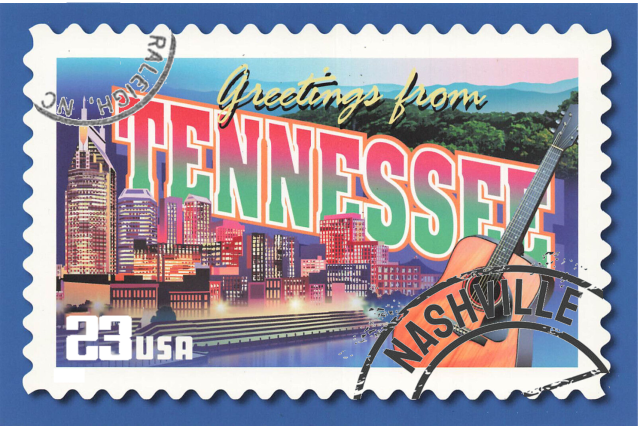 Guest Blog post by Michael Lang, Kansas Talking Books, KLAS Users' Group Past President, KLAS Programming Committee Member
Guest Blog post by Michael Lang, Kansas Talking Books, KLAS Users' Group Past President, KLAS Programming Committee Member
It’s happening; the first in-person KLAS conference since 2019! I am looking forward to traveling to Nashville this summer for A Perfect Tenn: KLAS UC2023 and I hope to see many of you there. We know not everyone can travel and are happy to be able to offer an online option for those who can’t. But if you’re sitting on the fence about which one to choose, I’m here to offer a gentle nudge toward the face-to-face option with my top five reasons to attend the UC2023 in person.
- Hands On Sessions: Have you checked out the proposed schedule for this conference yet? Tuesday, Wednesday, and Thursday each start with a two-hour hands-on training block that is only available on site. I’ve been to an in-person training with Keystone staff and can guarantee you’ll walk away with something new.
- Meet Keystone Staff: Speaking of staff, getting to know the Keystone staff and drilling down into the nitty gritty of KLAS with them is a fantastic learning opportunity.
- Spark New Ideas: I always come back from a conference ready to implement big changes. From my recent experience, that list hasn’t been as long with online conferences. The conversational nature of an in-person conference seems to inspire more ideas than the online format, where I find myself drawn away from my computer screen to take care of day-to-day tasks.
- Networking: Meet your peers from across the country. Learn how they do things. Find new ways to use KLAS. Get recruited for a committee. Enjoy the opening reception with great food and entertainment! I’m really excited to tour the Tennessee School for the Blind and learn about the services they provide to their students.
- Share Your Expertise: This one is a cheat. You can share your knowledge with the KLAS Users’ Group in either format. Whichever you choose, we want to hear from you. You can help make this an extraordinary learning experience by sharing your expertise and creativity with colleagues from other organizations and libraries! Submit your proposals on the KLAS Users’ website.
Whether attending in person or online, early-bird registration closes on April 30. Make your plans soon to save some money. Visit the registration page for details.
-
Notes From The Scribe - October 2018
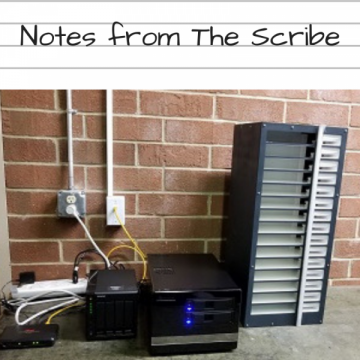
Hi all,
Here’s the Notes from The Scribe for October 2018.
A couple of cool new features and some improvements to our own processes have happened since September. Let’s go over some brief highlights since I last updated you all.
October saw the Inventory and Associate (IA) mode added. In this mode, you can add a cartridge to inventory and pair it with a patron at the same time. Meaning less worry about keeping an inventory available and also not having to tie up a staff member and their own computer while making cartridges available. To do this, you scan one barcode that puts The Scribe into Inventory and Associate mode. Then you take a batch of mail cards and cartridge labels printed out for each new patron added to this type of service and you pair them each to their own cartridges. When finished you scan another barcode, which puts The Scribe back into Duplication mode, and you’re now ready to duplicate items onto these cartridges.
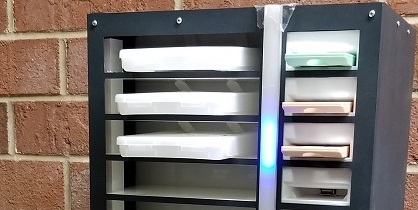
In conjunction with this process, the set up for the patron process for setting them up on this service was refined, so that before the actual mail card and label set was run for a patron cartridge, a set of books is already waiting to be duplicated. All fine adjustment of what the patron will receive on their first run is worked out first. This way, when staff puts The Scribe into Duplication mode things will run smoothly and the patron’s first books will be on their way right then.
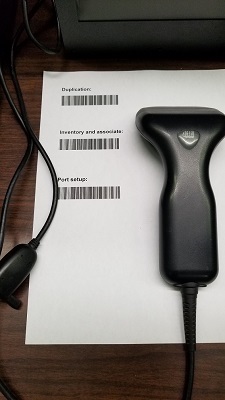
Related to this is another cool feature. You may have noticed that The Scribe doesn’t have a monitor attached to view anything happens while it’s running. As it turns out there is a monitor app that you can use to see the status of the cartridge slots and see what’s actually happening at each slot. This is a quick screen grab to give you an idea of what this looks like. This isn’t necessarily the final version, but it’s very useful even as is.
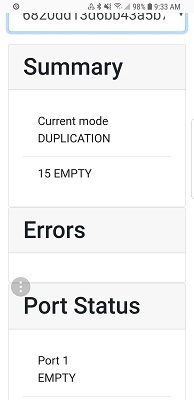
Another feature that was added, that many of you have now heard about, is the Service Queue tab in the Patron Module. This makes adding items to be duplicated on cartridge more efficient and easier. A very useful feature. Since we are fortunate to be the first users (the Guinea Pigs) we have been able to try it out, test it, and provide feedback for improvements. Some of which will be seen as things evolve into the system that will go live in the near future. For specific information about this exciting new feature, check out Drea Callicutt's article - KLAS Service Queue Sneak Peak.
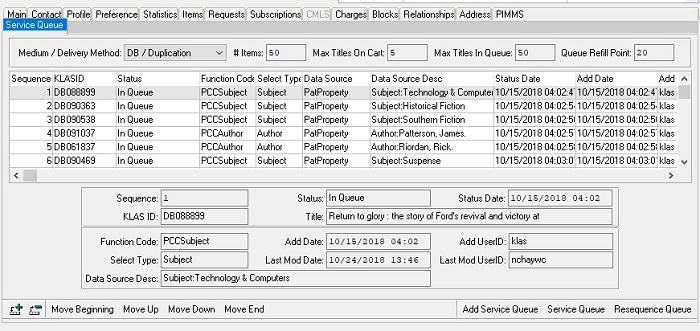
As a result of these enhancements, more processes were refined to match the workflow of our library and we held some more detailed staff training using these tools. Staff working together to put each other on the service so that we can all use the service ourselves and get a feel for what it will be like for patrons once we go live. This also gives us a chance to practice things in a more practical way.
We have had questions about from other about whether actual patrons are using this service yet. We are considering taking 5 to 10 willing patrons and letting them try out the service before we go live. The only downside to this will be having to import whatever hashads for books received during this time into the live database to keep our statistics accurate and to present issues to patrons once we move to the new live version. This is why we would only do this with a rough handful of patrons.
In any case, we are excited to move forward. That's all for this edition of Notes From The Scribe. The next edition will come out with the next round of updates and new features.
Page 2 of 2

